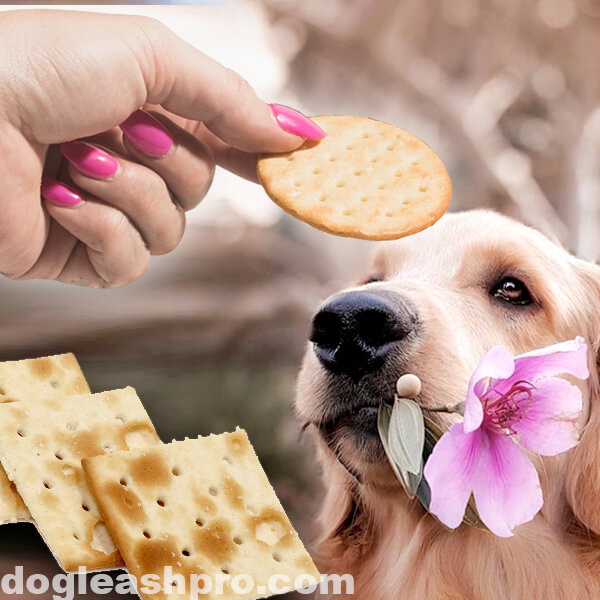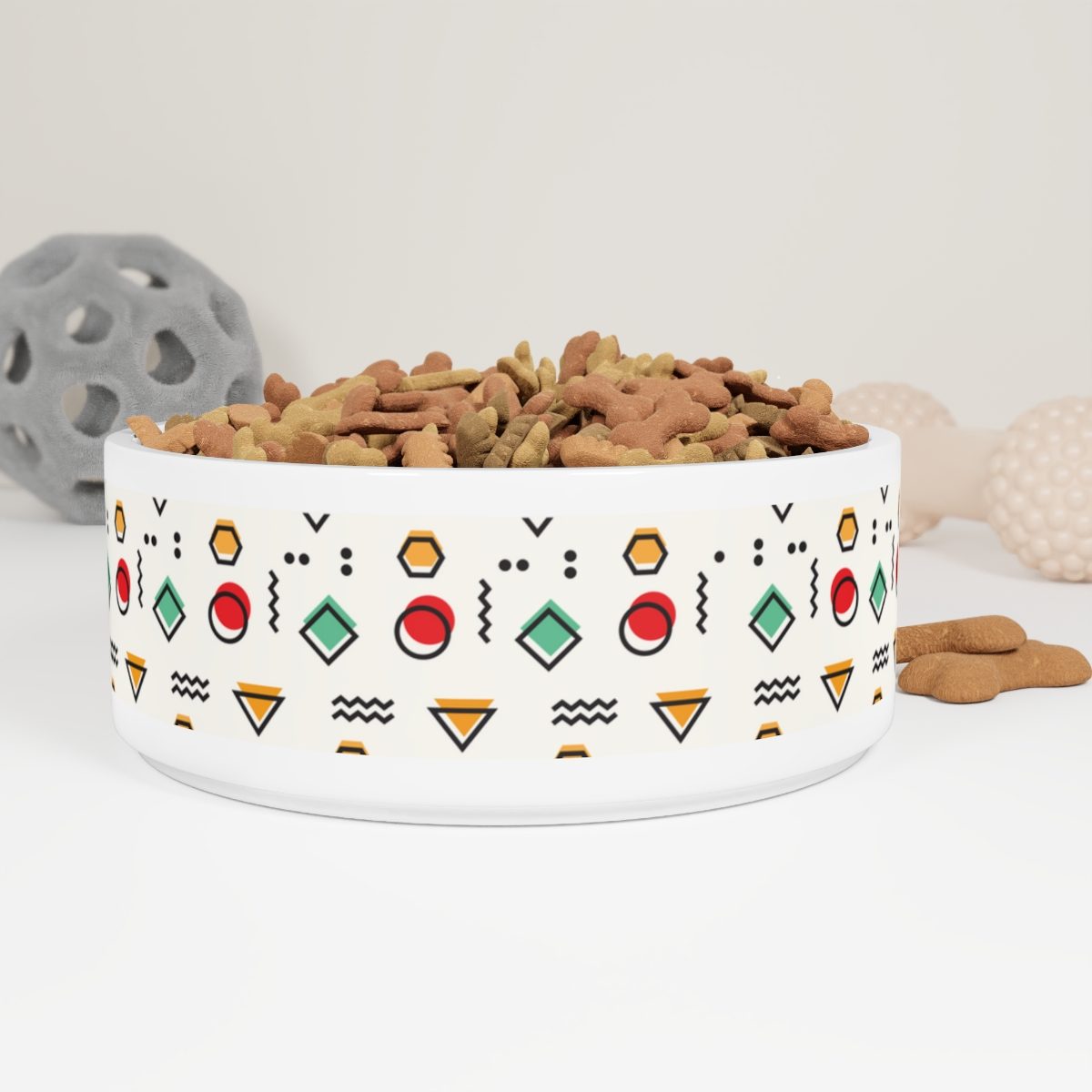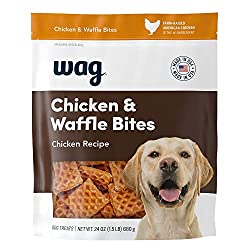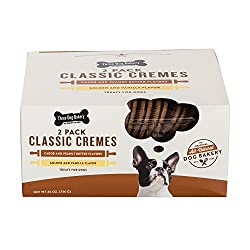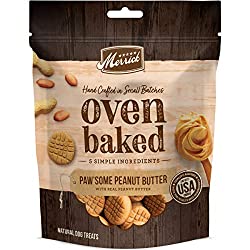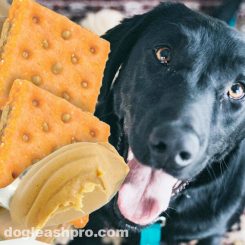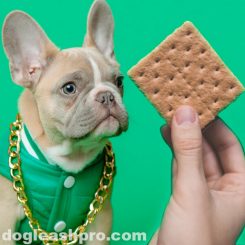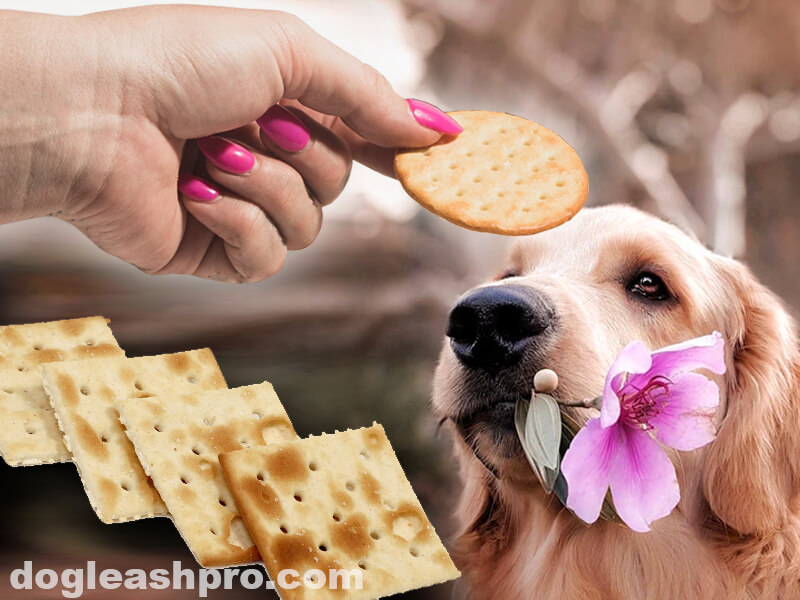
Can dogs eat Crackers? It depends on which Cracker snacks you are referring to. Before feeding the Crackers to your dogs, check to see if the ingredients on the nutrition label are canine-friendly. Most Crackers are high in calories, salt, sugar, fats, and carbs which are unhealthy for our dogs.
If you’re wondering if dogs can eat Crackers, you’ve come to the right place. We will cover all different varieties of Crackers and discuss whether they are safe for doggy consumption.
We consume many different types of Crackers that are unsafe for our furry friends. Crackers are usually made of wheat flour. If your dog is allergic to wheat, please do not feed them wheat Crackers like Wheat Thins. Also, excessive sugar or salt consumption can cause several health issues in dogs such as diabetes, weight gain, salt poisoning, and even pancreatitis.
Table of Contents
Can dogs have Crackers?
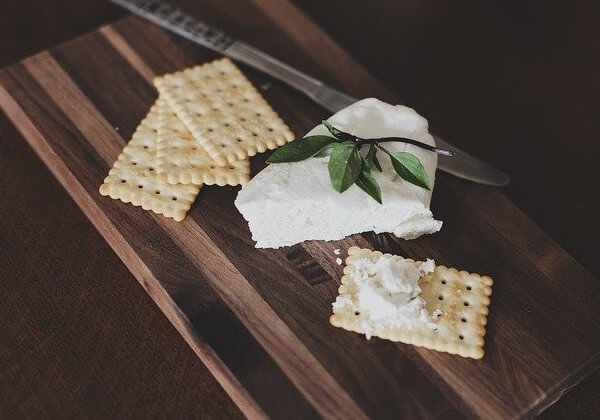
It depends. Some Crackers contain higher levels of salt, fats, sugar, and calories than others. Before you feed your K9 friends Crackers, be sure to check out the nutrition label and ingredients first.
Some flavored Crackers like cream cheese and chives Crackers or Ritz garlic butter Crackers contain more than your regular salt seasonings. They may have toxic ingredients and seasonings like chives or garlic powder that are poisonous to your furry friends.
If you must, allow your canine companions to have just 1 or 2 plain, unsalted, and unseasoned Crackers. After feeding them to your pooch, try not to give them any more snacks for the rest of the day. More snacks on top of these Crackers means that they will start to gain an unhealthy amount of weight and this can lead to obesity as well as other health problems in dogs.
Are Crackers bad for dogs?
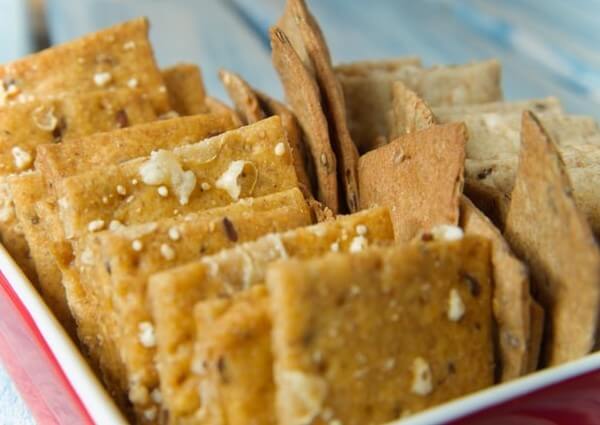
Yes, some Crackers are bad for dogs. It depends on which type of Crackers you’d like to feed your furry family member. Generally, Crackers that contain a high level of salt, sugar, fats, carbohydrates, and calories are bad for dogs. Toxic ingredients like chives and garlic powder are also bad for dogs.
Since wheat flour is usually one of the main ingredients in many different varieties of Crackers, make sure that your pups are not allergic to wheat before you feed them the Crackers.
Additionally, some Crackers contain dairy products like cheese and milk. If you know your dogs are lactose-intolerant, avoid feeding them these Crackers.
Crackers that are bad for dogs should be kept out of your dog’s reach. Owners should place them on high shelves inside a food cabinet or on top of the refrigerator.
Also, avoid leaving open and unfinished bags of Crackers sitting around on the table. Your pups are adventurous and will eat just about anything they can. When dogs get into a bag of Crackers that contain toxic ingredients, it is both unhealthy and potentially dangerous for them.
Are Crackers okay for dogs?
Crackers are generally not okay for dogs. If you offer one or two Crackers that do not contain harmful or toxic ingredients like sugar, salt, garlic, and onion to your canine friends as a rare occasional treat, then it should be okay for dogs.
However, if you feed your four-legged friends too many salty or flavored Crackers regularly, then Crackers are not okay for dogs.
As mentioned above, Crackers are high in calories, salt, sugar, fat, and carbohydrates. The high salt content in Crackers is harmful to dogs since it can cause sodium poisoning. Additionally, high sugar, fat, and carb content in Crackers can lead to a host of health issues including weight gain, upset stomach, diabetes, dental disease, metabolic changes, and even pancreatitis.
Dogs and popular Crackers
You’re probably eating one or more of these popular Crackers below. Read on to find out whether they are safe or harmful for doggy consumption.
Can dogs eat Triscuits?
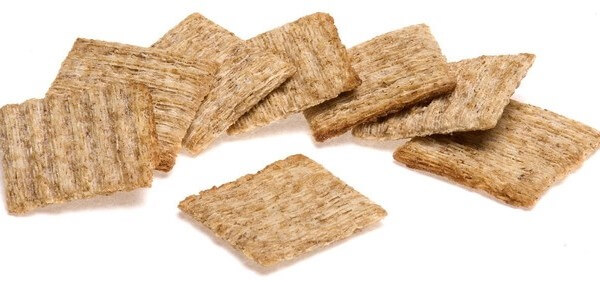
Dogs should not eat Triscuits on a regular basis. If you give your canine friends one or two Triscuits, that should be fine.
Let’s quickly take a look at the ingredients and nutritional profile in Triscuit Crackers to learn why:
- Whole grain wheat.
- Canola oil.
- Sea salt.
While this may seem fine for human consumption, these ingredients are not the most canine-friendly. Here’s why.
If we take a look at the nutritional profile of just one Triscuit Cracker, we see this:
Nutritional Profile of Triscuit Crackers (1 Cracker or 4.7 grams)
| Name, Unit | Amount |
| Calories, cal | 20 |
| Sugar, g | 0 |
| Sodium, mg | 26.7 |
| Carbohydrate, g | 3.3 |
| Total Fat, g | 0.6 |
| Protein, g | 0.5 |
| Fiber, g | 0.5 |
| Calcium, mg | 2 |
| Potassium, mg | 27 |
Just one Triscuit Crackers is already 20 calories, 0.6 grams of fat, and 3.3 grams of carbohydrate.
Keep in mind the 10% rule for dog treats. This means that your precious pooch should only have 10% of his daily calories from treats and 90% of his daily calories should be from his regular, healthy, and balanced dog food.
As we can see, Triscuit crackers are high in calories and too much calorie intake can cause weight gain in small or inactive dogs. This is why it’s essential that owners avoid feeding their K9 pals more than one or two Triscuits.
Additionally, just one Triscuit Cracker contains 26.7 mg of sodium. Too much salt intake can cause sodium poisoning in dogs. Signs of salt poisoning include muscle tremors and weakness, diarrhea, dehydration, frequent urination, and loss of appetite.
Triscuits are also high in fiber so eating more than a few Triscuits can cause diarrhea.
Lastly, whole wheat is one of the main ingredients in Triscuit Crackers so be sure not to feed your furry friends Triscuits if they are allergic to gluten.
Can dogs eat Honey Graham Crackers?
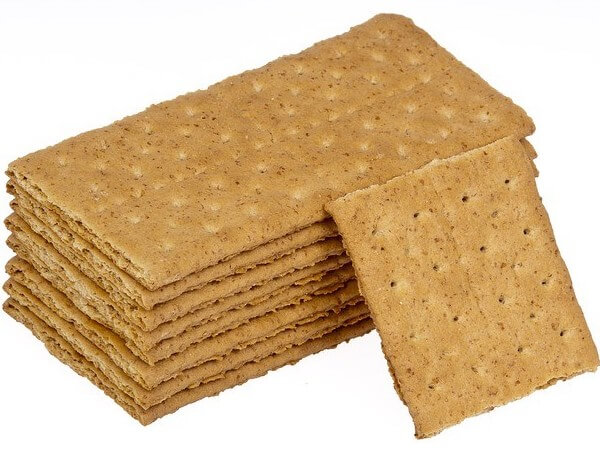
No, dogs should not eat Honey Graham Crackers because they are high in salt, sugar, fat, and calories. You can give your K9 pals 1 or 2 Honey Graham Crackers, but any more than that can cause weight gain, diabetes, and even sodium ion poisoning in dogs.
If you feed your four-legged friends Honey Graham Crackers, it’s best to provide them with a bowl of fresh cool water because they may feel thirsty. Avoid feeding them any more snacks for the remainder of the day.
Can dogs eat Honey Maid Graham Crackers?
No, dogs should not eat Honey Maid Graham Crackers. Similar to Honey Graham Crackers, the Honey Maid Graham Crackers also contain high levels of sugar, salt, calories, and fat. You can safely offer your furry pals 1 or 2 Honey Maid Graham Crackers, but no more than that.
Regularly feeding your pooch this Cracker can lead to obesity, diabetes, dental issues, and salt poisoning.
Expect extreme thirst from your furry friends if you offer them some Honey Maid Graham Crackers. Be sure to provide them with a bowl of fresh cool water. We highly recommend that you do not feed your pups any more snacks for the remainder of the day.
Can dogs eat Belvita Breakfast Biscuits?
Belvita Breakfast Biscuits come in a variety of different flavors. Many believe that the Belvita Crackers are high in fiber and it is a great high fiber breakfast choice.
However, Belvita Breakfast Biscuits are actually harmful to dogs because they are packed full of carbohydrates and sugar. Avoid feeding your canine friends Crackers that are high in sugar and carbs because it can cause dogs to experience the following:
- Upset stomach.
- Diarrhea.
- Weight gain.
- Obesity (if consumed regularly).
- Diabetes (if consumed regularly).
- Dental issues such as tooth decay and cavities.
- Pancreatitis.
If your pooch has the above symptoms, you’ll want to consult your vet right away. Do not feed Belvita Breakfast Biscuits to your furry family member anymore. If your pup accidentally ate one Belvita cracker, then he or she should be fine.
Can dogs eat cream cheese and chives Crackers?
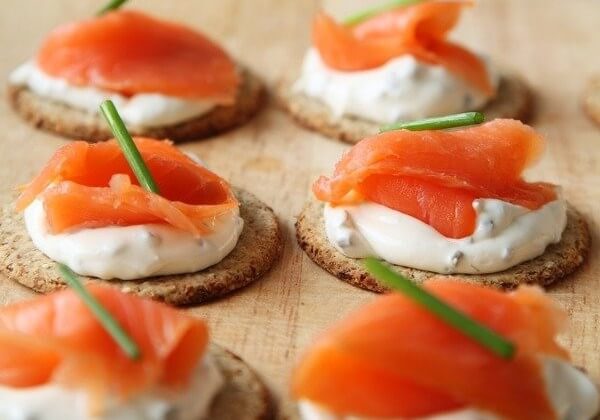
No, dogs should not eat cream cheese and chives Crackers. Chives belong to the allium family along with onion and garlic and all of them are toxic to our canine companions.
If you would like to feed your furry friends Lance Captain’s Wafers Cream Cheese & Chives Crackers or other types of Crackers with cream cheese and chives, please avoid doing so. These Crackers contain chives as one of the ingredients and that is poisonous to our dogs.
Also, cream cheese Crackers contain dairy products. The cream cheese is usually made of milk, cream, cheese cultures, dry milk, salt, and carob bean bum sodium caseinate. If your pups are lactose-intolerant, the cream cheese Crackers will not sit well in their stomach. That’s because they lack the lactase enzyme that helps to break down the lactose or sugar found in milk.
Signs and symptoms that your pooch is lactose intolerant includes:
- Bloating.
- Explosive diarrhea.
- Abdominal pain and discomfort.
So whether you have cream cheese Crackers or cheddar cheese Crackers, please do not feed them to dogs that are lactose-intolerant.
Can dogs eat Club Crackers?
No, dogs should not eat Club Crackers because these Crackers contain a high amount of salt. If you must, you can safely feed your pooch 1 or 2 Club Crackers. It’s best to keep your furry pals away from the Club Crackers by placing it on a high shelf or on top of the refrigerator.
If you’re eating Town House Crackers and your dogs want some, try not to feed them any if you can. Town House Crackers use the same ingredients as Club Crackers so what applies to Club Crackers applies to Town House Crackers.
Can dogs eat cream Crackers?
Dogs should not eat cream Crackers. If you’re planning to give your pooch Jacob’s Cream Crackers, make sure to only offer 1 or 2 and no more than that since they are high in calories, fat, sugar, and carbohydrates. That’s because Jacob’s Cream Crackers are similar to Saltine Crackers, but they have a lower salt content.
Can dogs eat oyster Crackers?
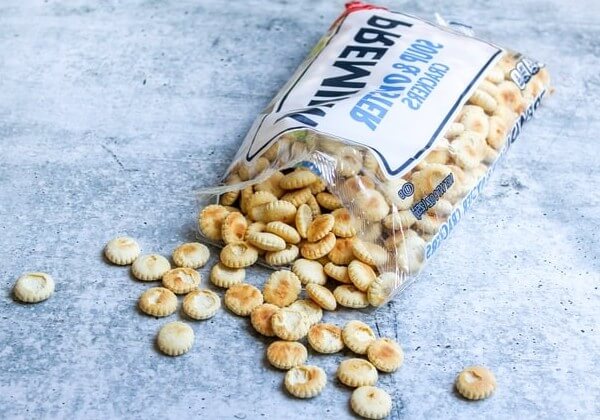
Yes, dogs can eat 1 or 2 oyster Crackers. It’s best to check how much sodium is in each package. Since oyster Crackers are very small, it’s very easy for dogs to eat all of them at once.
Luckily, oyster Crackers are generally plain with no added spices so they are safe for dogs to eat. If the oyster Crackers are high in salt, make sure to provide a bowl of fresh cool water for your pups in case they experience extreme thirst after eating a few oyster Crackers.
Can dogs eat prawn Crackers?
Yes, dogs can eat prawn Crackers since they are lower in fat, salt, and calories when compared to other Crackers. However, it’s important not to overfeed your pooch prawn Crackers. They are crunchy and your canine friend will want a bite or two or more. But as responsible dog owners, we should limit how many prawn Crackers we are feeding them.
If you’re referring to shrimp crackers and you’re wondering, Can dogs eat shrimp crackers?, the quick answer is no. Dogs should not eat shrimp Crackers because they contain ingredients such as palm oil, salt, and monosodium glutamate. Consuming too much salt can cause sodium poisoning in dogs.
Giving your pooch 1 or 2 shrimp Crackers is fine, but try not to offer them any more than that.
Can dogs eat unsalted Crackers?
Yes, dogs can eat 1 or 2 unsalted Crackers, but it’s important to take a look at the calories of one unsalted Cracker. In general, Crackers are made out of wheat flour and they are considered an empty-calorie human snack. Dogs will gain weight or pack on the pounds from the high levels of sugar, fats, and calories in these Crackers without receiving any nutritional value.
If the Crackers have a high sugar level, your pooch may get addicted to them.
For these reasons, it’s better to avoid feeding our pooch Crackers, whether they are unsalted or salted.
Can dogs eat cheese Crackers?
Dogs should not eat cheese Crackers. If you’re referring to either the crackers with cheese or the Ritz Cheese crackers, then dogs should not eat cheese Crackers. Keep in mind that Ritz has both the plain original Ritz Crackers and the Ritz Cheese Crackers.
Regularly allowing your dogs to eat cheese Crackers can cause diabetes, obesity, and tons of other health problems. If you take a look at the nutrition label of the cheese Crackers, you’ll notice that the majority of the ingredients are not safe or healthy for dogs such as salt, sugar, milk, palm oil, canola oil, and wheat.
Before you allow your pooch to eat cheese Crackers or any type of Crackers, find out if they are allergic to any of the ingredients used to make them. If you’re not sure, we highly recommend that you consult with your dog’s vet or bring your pup to the vet for allergy testing.
Can dogs eat Chicken In A Biscuit Crackers?
No, dogs should not eat Chicken In A Biscuit Crackers because it has a high salt content. If you must, it’s best to only give your canine friends one or two Chicken In A Biscuit Crackers. Any more than this can put your pups at risk of salt poisoning.
Be sure to provide them with a bowl of fresh cool water as salty snacks can cause extreme thirst. You can expect your furry pals to urinate more than before due to drinking more water.
After your pups have eaten a few of these Chicken In A Biscuit Crackers, try not to give them any more salty food or treats for the rest of the day.
Can dogs eat Belvita Crackers?
No, dogs should not eat Belvita Crackers because they are high in carbs and sugar. This can cause weight gain and diabetes in dogs. If you must, try to only give your pooch one Belvita Cracker. Too many Belvita Crackers can cause an upset stomach or even explosive diarrhea in dogs.
Can dogs eat Toast Chee Crackers?
No, dogs should not eat Toast Chee Crackers because they have a very high salt content. Thus, dog owners should avoid feeding their pups Toast Chee Crackers.
If your pooch accidentally ate one or two Toast Chee Cracker, they should be fine. However, make sure they do not eat any more food that contains salt for the rest of the day. It’s a good idea to provide a bowl of fresh cool water since your dog may be extremely thirsty after eating it.
Toast Chee Crackers also come with peanut butter flavor. Dogs that are allergic to peanuts should stay away from peanut butter Toast Chee Crackers.
Can dogs eat plain Crackers?
Yes, dogs can eat plain Crackers occasionally and in small quantities. If the Crackers are plain and unsalted, then they are relatively safe for dogs to eat. Compared to other Crackers that are flavored and seasoned with salt, plain Crackers are the safest for dogs.
However, keep in mind that Crackers are snacks made for human consumption and not for our furry pups. Plain Crackers are also considered an empty-calorie snack. When dogs eat plain Crackers, they are packing on the pounds without receiving any nutritional or health benefits.
For these reasons, there’s really no reason for dogs to eat plain Crackers so try not to give them these Crackers on a regular basis. Plain Crackers should only be given to dogs as a rare treat.
There are also plenty of canine-friendly treats that are low-calorie and provide nutritional benefits to our furry friends.
Can dogs eat Sourdough Crackers?
Yes, dogs can eat Sourdough Crackers in moderation (one or two Sourdough Crackers as a rare occasional treat) since they are not toxic to dogs.
It’s important to note that Sourdough Crackers are made of sourdough, whole wheat flour, sea salt, butter, and coarse salt.
Additionally, Sourdough Crackers are high in calories, fats, saturated fat, carb, and sodium.
Therefore, it is not safe to feed your canine friends Sourdough Crackers regularly or daily. Doing so can lead to weight gain, canine obesity, and other health issues. If you give your dogs Sourdough Crackers, make sure they don’t eat other snacks or food that is also high in calories, fat, carb, and sodium.
Can dogs eat baby Crackers?
Yes, dogs can eat 1 or 2 baby Crackers and no more than that. Baby crackers are exactly what the name suggests, crackers for babies. Since the crackers have a low amount of salt and the ingredients are easy for babies to digest, then they are relatively safe for dogs to eat.
Similar to plain Crackers, dogs should only eat baby Crackers occasionally if there are no other healthy dog treat options.
Crackers are usually high in calories and carbohydrates. Dogs, especially inactive ones, don’t need those extra calories in their diet because this can lead to weight gain. Our furry friends should also receive the necessary amount of carbohydrates from their regular dog food and not from human snacks.
If you give them 1 or 2 baby Crackers, make sure not to feed them any more treats for the rest of the day.
Can dogs eat butter Crackers?
No, dogs should not eat butter Crackers. Butter Crackers come in various varieties such as Town House Crackers, Pepperidge Farm Golden Butter Crackers, Ritz Garlic Butter Crackers, and Club Crackers.
They are all high in fats, salt, and calories so if you must give the butter Crackers to your pooch, make sure to do so occasionally and as a rare treat. Our furry friends can be at risk of several health problems from eating butter Crackers on a regular basis, including weight gain, diabetes, sodium poisoning, and even pancreatitis.
Additionally, if there are ingredients in the Crackers that are toxic to dogs, please do not feed them to your pooch. For instance, Ritz Garlic Butter Crackers contain garlic powder which is extremely dangerous for our furry friends. Garlic and onion, whether powder, raw, cooked, or fried are all toxic to our pooch.
Can dogs eat Matzo Crackers?
Yes, dogs can eat Matzo Crackers if they are plain and do not have any added salt. Matzo Crackers are also high in calories so if you’re offering them to your pooch, make sure to only give them 1 or 2. Avoid feeding them any more snacks for the remainder of the day.
What are some dog-friendly and safe alternatives to Crackers?
Instead of feeding our canine friends Crackers that are high in salt, carb, and fat, here are some dog-friendly alternatives to Crackers that your pooch can eat safely:
So, can dogs eat Crackers?
To err on the side of safety, it’s best not to share our Crackers with our furry friends. Instead, it’s best to give our pooch canine-friendly treats or treats that are made specifically for our dog’s consumption.
While most Crackers don’t taste that salty for us, they can be very salty for our dogs. Keep in mind that our dog’s salt intake tolerance is lower than us and feeding him Crackers that are salty can put him at risk for sodium poisoning.
If you’re ever unsure of what food or treats to give your furry friends, we highly recommend that you consult your vet. Your vet will know what food your pooch is allergic to or if your pooch is sensitive to wheat or gluten products.
DISCLAIMER: THIS WEBSITE DOES NOT PROVIDE MEDICAL ADVICE
The information, including but not limited to, text, graphics, images and other material contained on this website are for informational purposes only. No material on this site is intended to be a substitute for professional veterinary advice, diagnosis, or treatment. Always seek the advice of your veterinarian or other qualified health care provider with any questions you may have regarding dietary needs.
Resources:
https://en.wikipedia.org/wiki/Cracker_(food)
https://www.medicalnewstoday.com/articles/324453

With over five years of specialized experience as an animal writer, my expertise lies in dog nutrition, health, behavior, grooming, and training. I am dedicated to delivering helpful and informative content that caters to the well-being of our furry friends. My primary goal is to empower pet owners with knowledge and ensure our canine companions thrive in health and happiness. In my free time, I love volunteering at local dog rescue centers.
